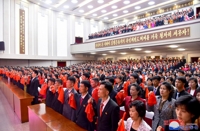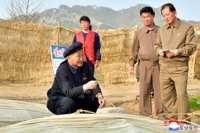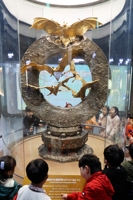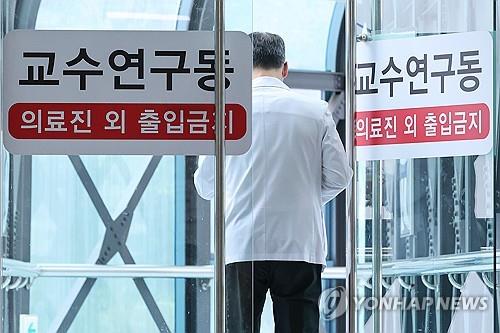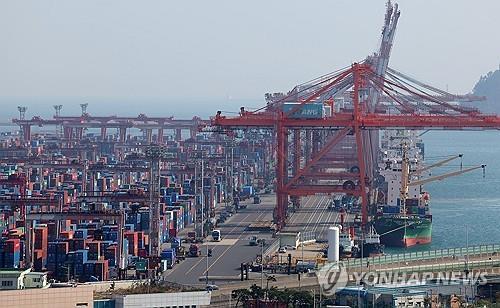(3rd LD) N. Korean missile launch highlights need to engage in diplomacy: official
(ATTN: UPDATES with reports of remarks from a White House spokesperson in paras 5-8)
By Byun Duk-kun
WASHINGTON, Oct. 19 (Yonhap) -- North Korea's latest missile launch highlights the urgent need to engage with the reclusive state in dialogue, a senior South Korean official said Tuesday.
The official also said South Korea, Japan and the United States share concerns over the North's missile launch.
"There were concerns since the North's continued missile launches may affect our efforts (to resume dialogue) to a certain extent as we discuss ways to bring North Korea back to dialogue," the official said while speaking to reporters on condition of anonymity.
"Still, there were views that the missile launch, on the other hand, demonstrates the need to quickly engage with North Korea in dialogue," the official said of a trilateral meeting between the top nuclear envoys of South Korea, Japan and the United States held earlier Tuesday in Washington.
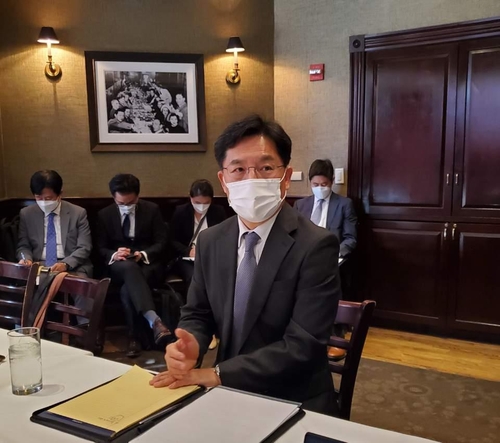
South Korea's top nuclear envoy Noh Kyu-duk speaks at a press conference after his bilateral and trilateral meetings with his American and Japanese counterparts in Washington on Oct. 19, 2021. (Yonhap)
The official's remarks were soon echoed by White House Press Secretary Jen Psaki.
"These launches also underscore the urgent need for dialogue and diplomacy," she said in a daily press briefing at the White House.
The White House official also reaffirmed U.S. commitment to engage with North Korea.
"Our offer remains to meet anywhere, anytime without preconditions," she said. "We call on the DPRK to refrain from further provocations and engage in sustained and substantive dialogue."
DPRK stands for the Democratic People's Republic of Korea, the North's official name.
North Korea fired what appeared to be a submarine-launched ballistic missile (SLBM) on Tuesday (Seoul time), shortly after U.S. Special Representative for North Korea Sung Kim reaffirmed U.S. commitment to engage with North Korea following his bilateral meeting with his South Korean counterpart, Noh Kyu-duk. Noh is South Korea's special representative for Korean Peninsula peace and security affairs.
"In today's meeting, South Korea, the U.S. and Japan shared their views on recent conditions surrounding the Korean Peninsula, including the latest missile launch. (We) agreed on the importance of maintaining stability on the Korean Peninsula, and agreed to work closely together to restart the Korean Peninsula peace process at an early date," Noh said of Tuesday's trilateral talks that also involved Japan's Takehiro Funakoshi.
The U.S. State Department earlier condemned the North Korean missile launch as a violation of U.N. Security Council resolutions that prohibit any nuclear or ballistic missile tests by the North.
The latest missile launch marks the eighth missile test by North Korea this year.
The South Korean official who spoke on condition of anonymity, however, noted the missile tests will not immediately undermine the countries' joint efforts to restart dialogue with the reclusive North.
"It is about a violation of U.N. Security Council resolutions, but there are different levels (of violation). Will the missile launch lead to a change in ways to engage with North Korea that South Korea and the United States, as well as South Korea, the U.S. and Japan, have been discussing based on its level? I do not believe so," the official said.
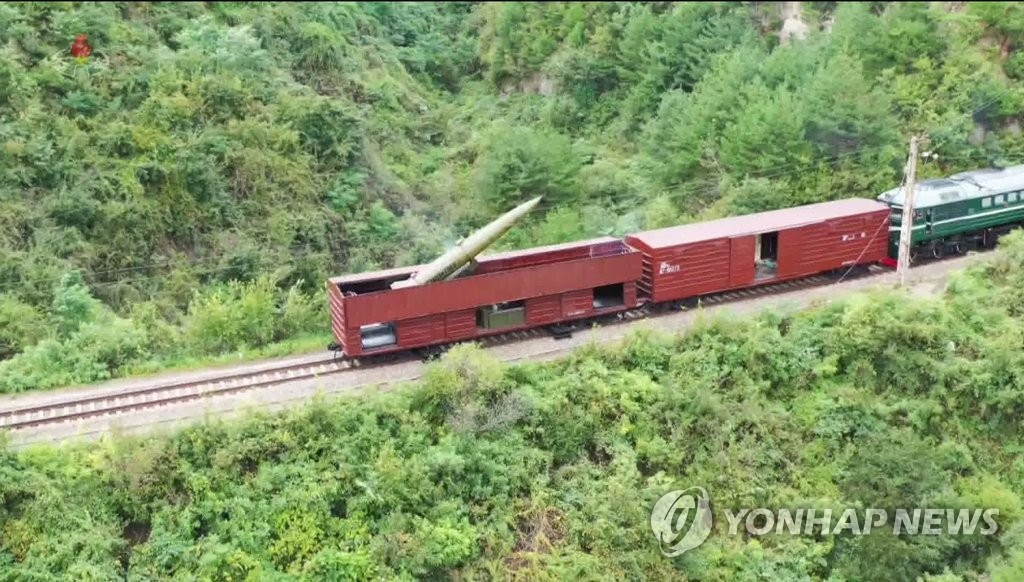
This photo, captured from North Korea's official Korean Central Television on Sept. 16, 2021, shows a short-range ballistic missile on a train before being fired the previous day. (For Use Only in the Republic of Korea. No Redistribution) (Yonhap)
The official noted the efforts to bring North Korea back to the dialogue table may include providing humanitarian assistance to the impoverished country, which he said may now only require the North's consent.
"Humanitarian assistant projects for North Korea have been discussed for months between South Korea and the U.S. as joint projects. South Korea and the U.S. have nearly reached a consensus on issues such as how they will be proceeded, but I believe there still need to be discussions on when they would be pursued since humanitarian cooperation projects require North Korea's consent," said the official.
The U.S. State Department confirmed the U.S.' support for humanitarian assistance for the people of North Korea.
"Special Representative Kim expressed support for humanitarian aid for the most vulnerable North Koreans and affirmed U.S. commitment to the immediate resolution of the abductions issue," the department said of Kim's three-way meeting with his South Korean and Japanese counterparts, referring to the issue of Japanese nations believed to have been abducted by North Korea.
"Special Representative Kim emphasized U.S. condemnation of the DPRK's October 19 ballistic missile launch, which violates multiple UN Security Council resolutions, and called on the DPRK to refrain from further provocations and engage in sustained and substantive dialogue," it added in a press release.
South Korea and the U.S. also continue to consider declaring a formal end to the Korean War as a way of restarting dialogue with the North, according to the senior South Korean official who is on a visit to Washington.
"A declaration of the war's end is a considerably significant step that can lead to dialogue, an opening for the start of dialogue with North Korea," said the official.
"I would say it is too early to definitely say what the U.S. position is, but I would say our consensus continues to expand," the official added.
South and North Korea remain technically at war as the 1950-53 Korean War ended only with an armistice.
bdk@yna.co.kr
(END)
-
 S. Korea marks 30th anniv. of Korean Pavilion at Venice Biennale with contemporary art
S. Korea marks 30th anniv. of Korean Pavilion at Venice Biennale with contemporary art -
 Artist Lee Bae captures ethereal Korean aesthetics at Venice Biennale
Artist Lee Bae captures ethereal Korean aesthetics at Venice Biennale -
 Ateez member Yunho throws first pitch at MLB match between Dodgers, Mets
Ateez member Yunho throws first pitch at MLB match between Dodgers, Mets -
 Gov't likely to accept university chiefs' request to lower med school enrollment quota
Gov't likely to accept university chiefs' request to lower med school enrollment quota -
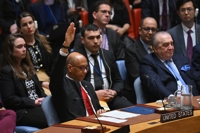 S. Korea supports resolution backing U.N. membership of Palestine
S. Korea supports resolution backing U.N. membership of Palestine
-
 Artist Lee Bae captures ethereal Korean aesthetics at Venice Biennale
Artist Lee Bae captures ethereal Korean aesthetics at Venice Biennale -
 S. Korea marks 30th anniv. of Korean Pavilion at Venice Biennale with contemporary art
S. Korea marks 30th anniv. of Korean Pavilion at Venice Biennale with contemporary art -
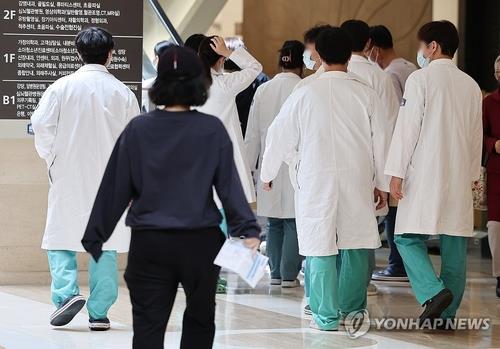 Gov't likely to accept university chiefs' request to lower med school enrollment quota
Gov't likely to accept university chiefs' request to lower med school enrollment quota -
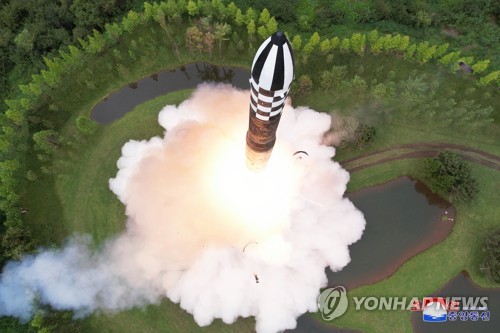 Experts see possibility of N.K. conducting nuclear test before U.S. presidential vote
Experts see possibility of N.K. conducting nuclear test before U.S. presidential vote -
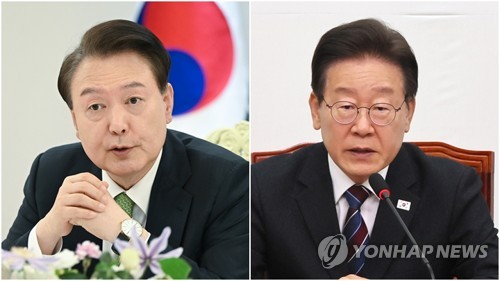 Details of meeting between Yoon, opposition leader undecided: presidential office
Details of meeting between Yoon, opposition leader undecided: presidential office
-
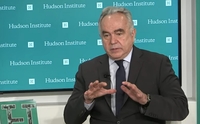 U.S. will take steps for three-way engagement on nuclear deterrence with S. Korea, Japan: Campbell
U.S. will take steps for three-way engagement on nuclear deterrence with S. Korea, Japan: Campbell -
 (LEAD) Hybe to file complaint against sublabel executives over internal conflict
(LEAD) Hybe to file complaint against sublabel executives over internal conflict -
 S. Korea reports highest suicide rate, ultra fine dust level among OECD nations: data
S. Korea reports highest suicide rate, ultra fine dust level among OECD nations: data -
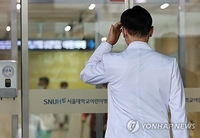 Looming weekly closure of major hospitals feared to worsen medical service crisis
Looming weekly closure of major hospitals feared to worsen medical service crisis -
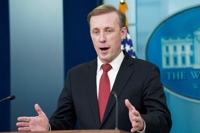 U.S. sent ATACMS missiles to Ukraine following Russia's use of N.K. missiles: White House
U.S. sent ATACMS missiles to Ukraine following Russia's use of N.K. missiles: White House
















